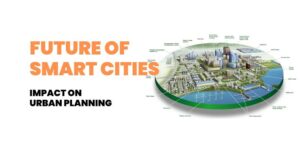Smart Cities: With the pace of urbanization speeding up around the globe cities are confronted with challenges like a surge in population environmental deterioration and the pressing need for development. To tackle these issues the concept of smart cities has emerged blending technologies with creative urban design to improve the well being of residents.
This approach brings together aspects such as data analysis, Internet of Things (IoT) devices and eco friendly infrastructure to build urban spaces that are efficient, enjoyable and adaptable. This article delves into the future of cities and city planning exploring trends, advantages, obstacles and the impact of technology on shaping cityscapes.
Understanding Smart-Cities
Smart cities are urban areas that leverage technology and data to improve the efficiency of services, enhance residents’ quality of life, and foster sustainable development. At their core, smart cities utilize connectivity and real-time data to optimize city operations, manage resources effectively, and create a more interactive relationship between citizens and their environment.
Key Features of Smart Cities
Several features define smart cities, including:
- Connectivity: Smart cities rely on a robust digital infrastructure that supports high-speed internet and wireless connectivity. This infrastructure facilitates communication between devices, city services, and residents.
- Data-Driven Decision Making: Utilizing data analytics and big data allows city planners to make informed decisions, improving service delivery and resource allocation.
- Sustainable Practices: Smart cities prioritize sustainability by implementing green technologies, promoting renewable energy sources, and enhancing waste management systems.
- Citizen Engagement: Smart cities encourage active participation from residents through mobile applications, social media, and other platforms, fostering a sense of community and collaboration.
The Benefits of Smart Cities
The adoption of smart city initiatives presents numerous benefits that can significantly enhance urban living.
Improved Quality of Life
One of the primary objectives of smart cities is to enhance the quality of life for residents. By optimizing city services such as transportation, healthcare, and public safety, smart cities can create a more efficient and enjoyable living environment. For instance, smart traffic management systems can reduce congestion, making commuting faster and more reliable.
Enhanced Sustainability
Smart cities play a vital role in promoting sustainability. By implementing energy-efficient technologies, such as smart grids and energy-efficient buildings, cities can reduce their carbon footprint. Additionally, smart waste management systems can optimize collection routes, reducing emissions associated with waste disposal and improving recycling rates.
Economic Growth and Innovation
The integration of technology in urban planning fosters economic growth by attracting businesses and encouraging innovation. Smart cities create an environment conducive to startups and tech companies, leading to job creation and enhanced economic resilience. Moreover, improved infrastructure and services can attract investments and tourism, further stimulating local economies.
Resilience and Adaptability
Smart cities are better equipped to respond to challenges such as climate change, natural disasters, and public health emergencies. By leveraging real-time data, city officials can quickly assess situations, implement emergency response measures, and allocate resources effectively. This resilience enhances the city’s ability to adapt to changing circumstances and ensures the safety of its residents.
Key Trends Shaping the Future of Smart Cities
Several trends are emerging in the realm of smart cities and urban planning, each contributing to the evolution of urban environments.
Integration of IoT Devices
The Internet of Things (IoT) is revolutionizing urban living by enabling the interconnection of various devices and systems. From smart streetlights that adjust brightness based on pedestrian activity to environmental sensors that monitor air quality, IoT devices provide real-time data that can be utilized for effective city management. This integration allows cities to respond proactively to issues, enhancing overall efficiency.
Autonomous Transportation
The rise of autonomous vehicles (AVs) presents new opportunities for urban mobility. As AV technology matures, cities will need to adapt their infrastructure to accommodate self-driving cars, shuttles, and delivery drones. This shift could lead to reduced traffic congestion, lower emissions, and enhanced public transportation options. Additionally, smart traffic systems can optimize routes for AVs, improving overall traffic flow.
Data-Driven Urban Planning
Data analytics is becoming an essential component of urban planning. By analyzing demographic trends, traffic patterns, and environmental data, planners can make informed decisions that shape the future of cities. Predictive analytics can anticipate future needs, allowing cities to invest in infrastructure and services proactively. This data-driven approach enables more effective resource allocation and improved public services.
Emphasis on Citizen-Centric Design
The future of smart cities will focus on citizen engagement and participatory design. Urban planners are increasingly recognizing the importance of involving residents in decision-making processes. Through surveys, community forums, and digital platforms, citizens can provide valuable feedback on urban development projects. This approach ensures that urban spaces are designed to meet the needs and preferences of the community, fostering a sense of ownership and belonging.
Green Infrastructure and Resilience Planning
Sustainability is a central theme in the future of smart cities. Urban planners are increasingly adopting green infrastructure strategies, such as green roofs, permeable pavements, and urban forests. These features enhance urban resilience by managing stormwater, improving air quality, and providing green spaces for recreation. Resilience planning is essential for addressing the impacts of climate change and ensuring the long-term sustainability of urban environments.
Challenges Facing Smart Cities
While the potential benefits of smart cities are significant, several challenges must be addressed to realize this vision.
Data Privacy and Security
The integration of technology and data collection raises concerns about privacy and security. Protecting citizens’ data from breaches and misuse is paramount. Cities must implement robust cybersecurity measures and establish clear policies on data ownership and usage to build public trust in smart city initiatives.
Infrastructure Investment
Developing the infrastructure necessary for smart city initiatives requires substantial investment. Many cities face budget constraints, making it challenging to implement comprehensive smart city strategies. Public-private partnerships and innovative funding models will be crucial for financing these initiatives and ensuring equitable access to technology.
Technological Disparities
The digital divide poses a significant challenge in the development of smart cities. Not all residents have equal access to technology, which can exacerbate existing inequalities. Ensuring that smart city initiatives are inclusive and accessible to all residents is essential for fostering social equity.
Interoperability and Standardization
As cities adopt various technologies, ensuring interoperability between different systems becomes critical. Lack of standardization can lead to inefficiencies and complications in integrating new technologies. Establishing common standards and protocols will facilitate smoother implementation and operation of smart city solutions.
Conclusion: The Path Forward for Smart Cities
The future of smart cities and urban planning holds immense promise for creating sustainable, efficient, and livable urban environments. By leveraging technology, data, and community engagement, cities can address pressing challenges and enhance the quality of life for residents. However, realizing the full potential of smart cities requires addressing challenges related to data privacy, infrastructure investment, and social equity.
As urbanization continues to accelerate, the need for innovative and adaptable urban planning strategies becomes increasingly important. Policymakers, urban planners, and citizens must collaborate to develop smart city initiatives that prioritize sustainability, resilience, and inclusivity. By embracing these principles, cities can pave the way for a brighter and more sustainable future, ensuring that they remain vibrant and dynamic places for generations to come.




Ok
Nice article
Your article helped me a lot, is there any more related content? Thanks! https://accounts.binance.com/register?ref=P9L9FQKY
Ok testing it out
hczkq4